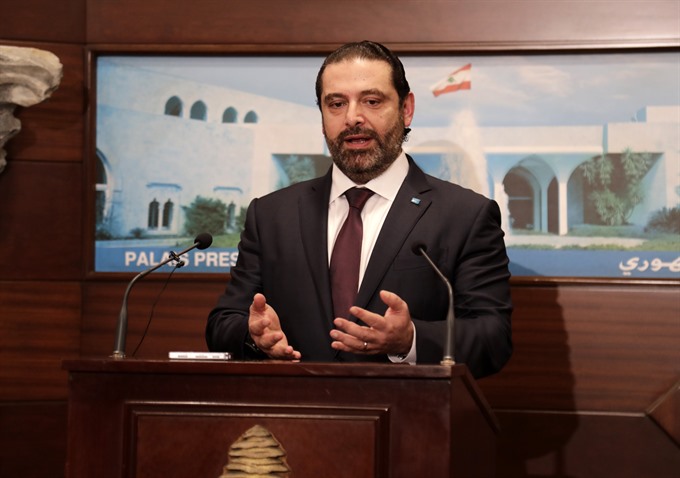 World
World

Lebanon announced a government line-up on Thursday, ending an eight-month wait that had heightened fears of a major economic collapse.
 |
| Lebanese Prime Minister Saad Hariri addresses the media after announcing the new cabinet during a press conference at the presidential palace in Baabda, east of the capital Beirut on Thursday. — AFP/VNA Photo |
BEIRUT— Lebanon announced a government line-up on Thursday, ending an eight-month wait that had heightened fears of a major economic collapse.
The new cabinet, unveiled during a press conference at the presidential palace, includes 30 ministers from Lebanon’s rival political clans.
The new line-up is to see four women take up office, including at the head of the interior and energy ministries.
Gibran Bassil is to remain as foreign minister, while Ali Hassan Khalil is also staying on in charge of the finance ministry.
On May 24, after parliamentary elections, President Michel Aoun quickly nominated Prime Minister Saad Hariri for his third term as premier and tasked him with forming a cabinet.
But political parties in the small multi-confessional country spent eight months arguing over the new government’s make-up.
"We are facing economic, financial, social and administrative challenges," Hariri said at a press conference after the announcement.
"It has been a difficult political period, especially after the elections, and we must turn the page and start working," he said.
Late Thursday, fireworks resounded in the Lebanese capital.
A new government will be able to unlock billions of dollars in aid pledged at a conference in April, notably to help boost the country’s ailing infrastructure.
Lebanon is governed by a complex system which aims to maintain a precarious balance of power across religious and political communities.
Positions shared out
But finding that equilibrium in government cabinets often takes time.
In 2009, it took Hariri five months to form a government, while his successor Tammam Salam took a whole ten months after he was nominated in 2013.
These delays are often linked to tensions over neighbouring Syria.
They have been exacerbated since civil war broke out there in 2011, sending tens of thousands of Syrians fleeing into Lebanon.
This time, the latest sticking point was finding a spot in government to represent independent Sunni lawmakers opposed to the premier but allied to Hezbollah.
On Thursday, the president’s Free Patriotic Movement took 10 positions, including foreign minister, giving an eleventh spot to the independent Sunni lawmakers.
Its ally Shiite movement Hezbollah took three portfolios, including the health ministry.
Fellow Shiite party Amal also took three, among them finance.
Hariri’s Future Movement party took five posts.
Listed as a terror organisation by the United States, Hezbollah is the only party not to have disarmed after the Lebanese civil war from 1975 to 1990.
It is a staunch ally of the regime in Syria, where it has helped President Bashar al-Assad’s forces regain large parts of the country from rebels and jihadists.
The new women ministers include Raya al-Hasan as interior minister from the premier’s Future Movement.
Nada Boustani, from the Free Patriotic Movement, is to become energy and water minister.
‘Challenges’
The new government now has 30 days to draw up a ministerial declaration to outline its priorities before it starts working.
This too could prove to be difficult, in view of internal divisions.
Contentious issues include Lebanon’s relations with Syria’s Assad, the future of around one million Syrian refugees in a country of 4.5 million, and Hezbollah’s weapons arsenal.
Analysts says the new cabinet’s main challenge will be the economy.
Lebanon’s service-oriented economy had looked on the brink of collapse for some time, but a Paris conference dubbed CEDRE in April made aid pledges worth US$11 billion.
"The financial situation in Lebanon has become unbearable," Hariri said earlier in the day.
"The challenges facing us are huge, and the available means are limited," he said.
Growth stood at more than 9 per cent before the war broke out in Syria, but has since plummeted to around 1 percent in recent years.
It is one of the world’s most indebted countries, with public debt estimated at 141 per cent of gross domestic product in 2018, according to Moody’s Investors Service.
Unemployment doubled between 2011 and 2014 to reach 20 per cent, and the state cannot provide water and electricity to all its citizens – even in central Beirut. — AFP




